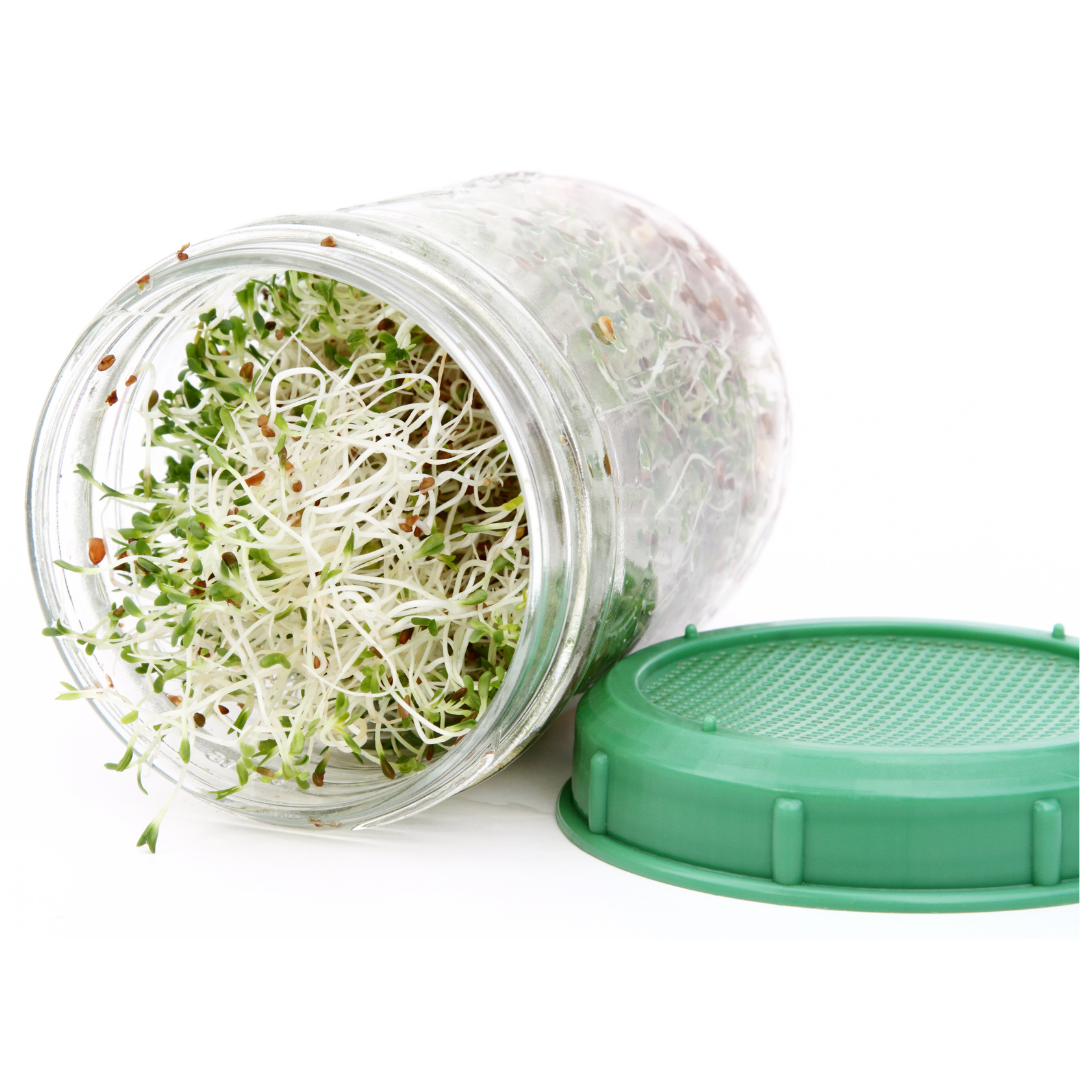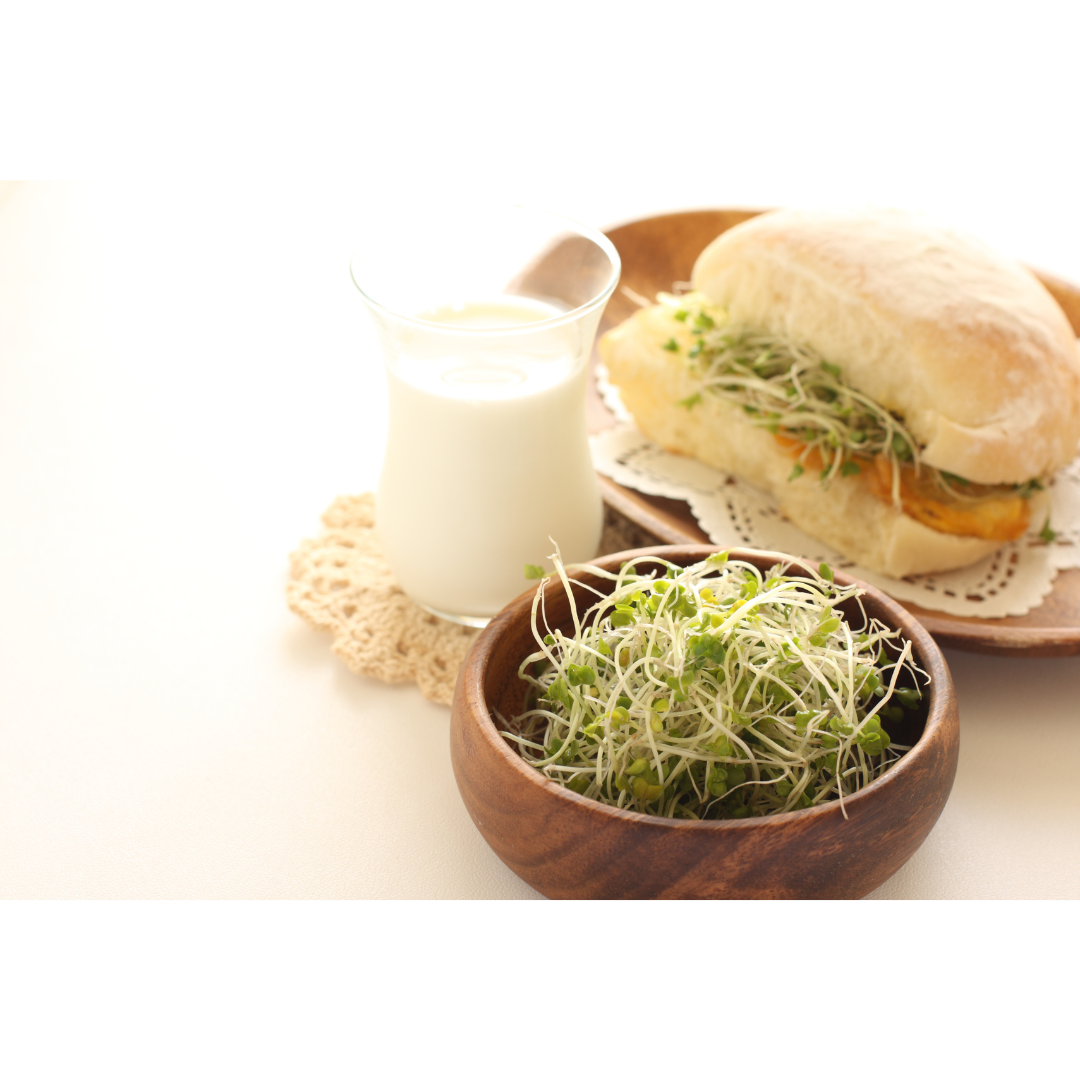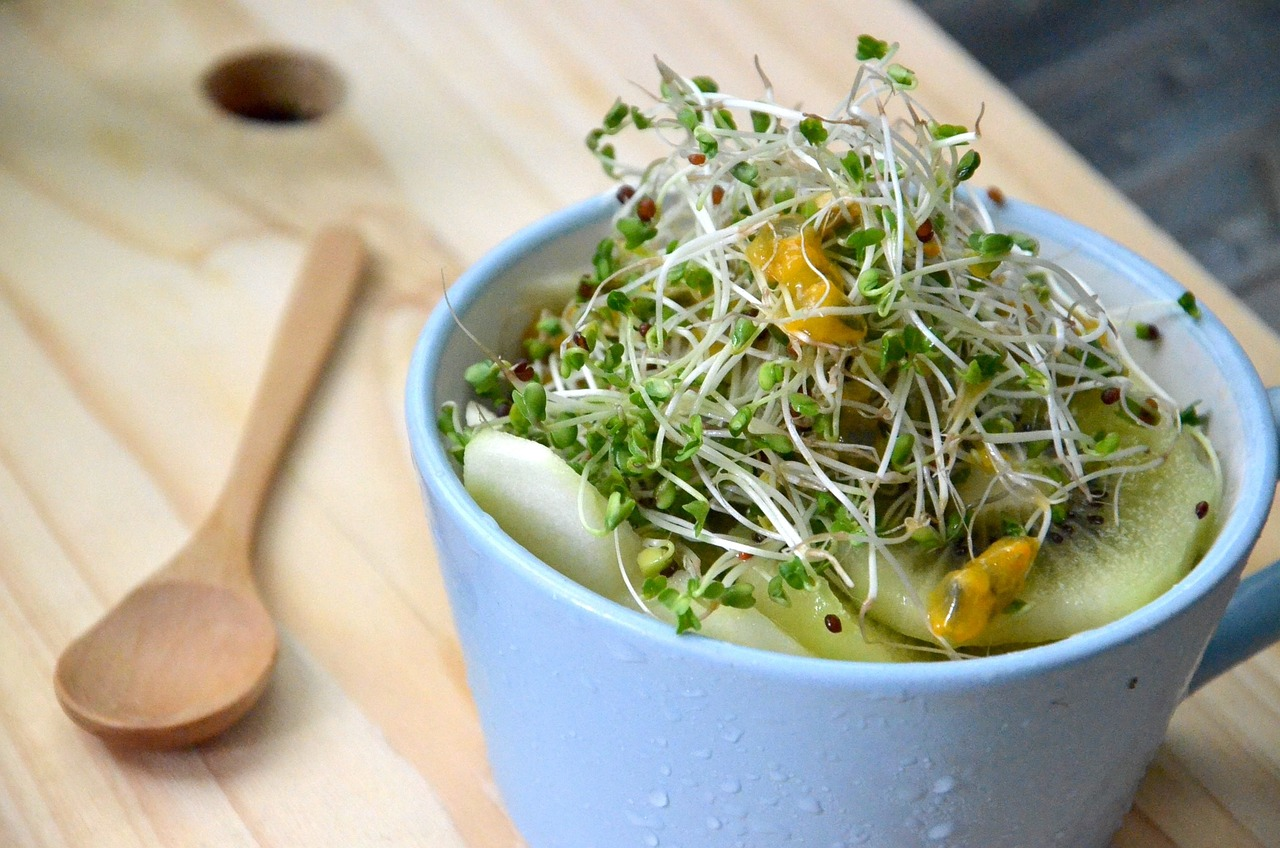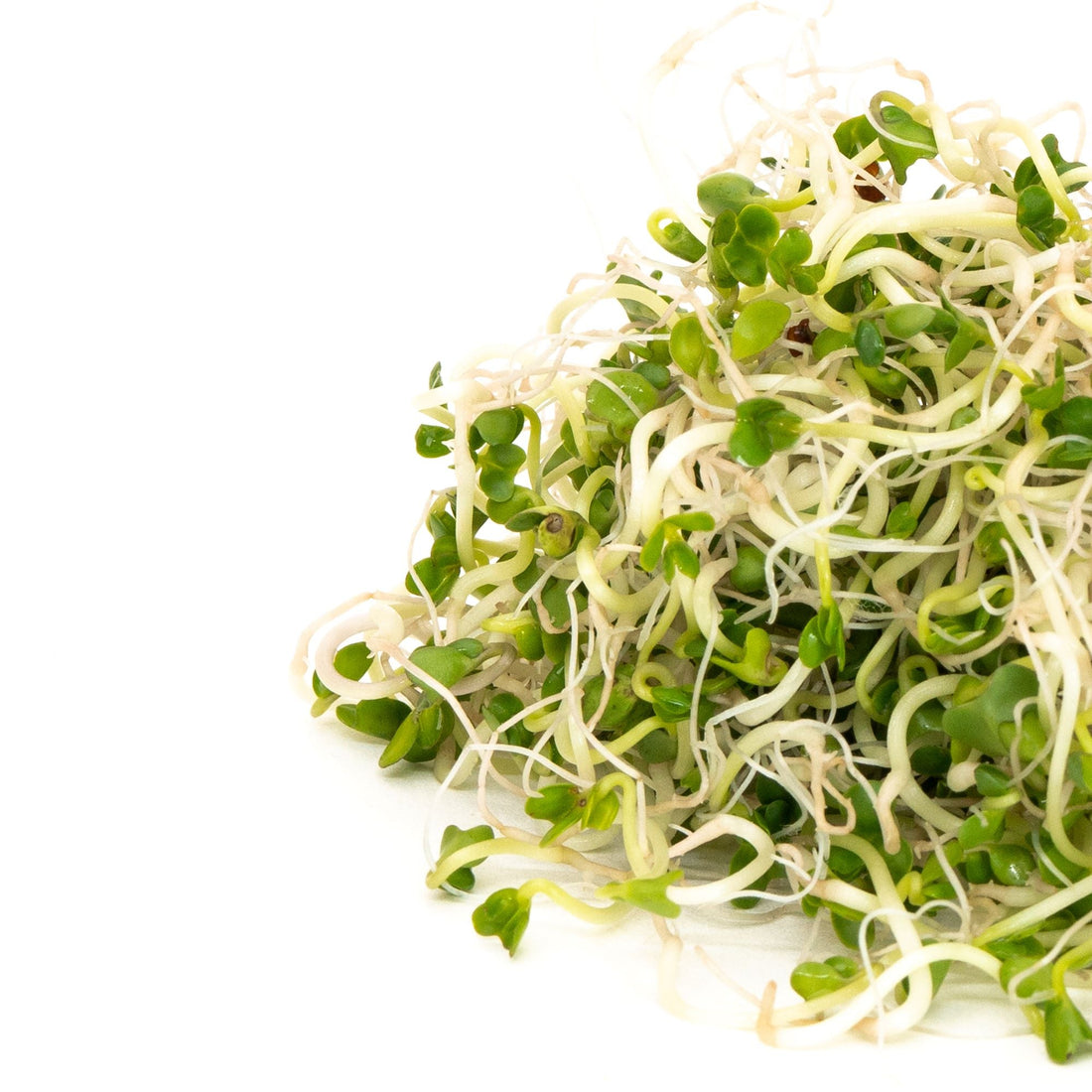Broccoli sprouts have been rapidly gaining popularity in recent years thanks to the general population's increasing interest in health and living a healthy lifestyle. Part of its growing popularity is not just its availability in health food stores but the fact that anyone can easily grow their own sprouts with broccoli microgreen seed and a mason jar and have a batch of fresh broccoli sprouts in just 3-4 days.
Broccoli sprouts also owe their popularity to Dr. Rhonda Patrick, a biomedical researcher, and educator who has been championing their health benefits and urging people to eat them for better health.
In the last twenty years, researchers have studied nutrient-dense foods like broccoli sprouts and found that these sprouts are filled with not just vitamins and minerals but other bioactive compounds such as glucosinolates, which aid in inflammation, stress response, and metabolism, and phenolic compounds that mitigate the effects of oxidative stress.
What are broccoli sprouts?
Broccoli is a well-known member of the cruciferous vegetable family that includes cabbage, arugula, cauliflower, and kale. Cruciferous vegetables are known for their antibacterial and anti-inflammatory properties.
Full-grown broccoli comprises several florets that form the main head that stems from a central stalk surrounded by leaves. Depending on the variety, a head of broccoli can be harvested anywhere between 50-90 days.
On the other hand, broccoli sprouts are extremely young broccoli plants harvested when they are 5-7 days old. Broccoli sprouts closely resemble alfalfa sprouts, with a stem a couple of inches long and two leaf-like cotyledons at the tip.
What do broccoli sprouts taste like?
While alfalfa offers a nutty taste, broccoli sprouts have an earthier, more peppery flavor similar to radish.
What are the benefits of broccoli sprouts and broccoli?
Broccoli is an excellent source of vitamin C, vitamin K, B vitamins, and other micronutrients.
While other cruciferous vegetables are nutrient-dense, broccoli sprouts contain high levels of vitamins (A, C, K, and folic acid), minerals (potassium, calcium, magnesium, and selenium), phenolic compounds, carotenoids, chlorophyll, amino acids, dietary fiber, and sulforaphane, which is a type of isothiocyanate.
Scientists have made associations between eating cruciferous vegetables and all-cause mortality. They found that the more cruciferous vegetables are eaten, the lower the risk of all-cause mortality, including heart disease, cerebrovascular disease, several types of cancer, and injury-related mortality—all thanks to isothiocyanates.
Isothiocyanates
Isothiocyanate is found in cruciferous vegetables. The compound is found in high amounts in broccoli and even higher amounts in broccoli sprouts.
Isothiocyanates reduce inflammation and oxidative stress related to chronic diseases, inhibit the activation of procarcinogens, and enhance the excretion of carcinogens, effectively reducing the risk of cancer.
Phenolic Compounds
Phenolic compounds are metabolites from plants that have been mainly reported for their antioxidant activity but are also associated with anticarcinogenic, antimicrobial, anti-inflammatory, and anti-aging properties.
Carotenoids
Carotenoids are present in high amounts in broccoli sprouts and because they have antioxidant properties, they may aid in preventing degenerative conditions such as cardiovascular diseases, diabetes, skin damage, and cancers like prostate cancer and breast cancer. Carotenoids also play a part in boosting the immune system.
Chlorophylls
Chlorophylls are regularly found in both broccoli sprouts and broccoli sprout extract. Like carotenoids, they have anti-inflammatory, antioxidant, and anti-mutagenic potential, which may also prevent cancer cells from forming.
Sulforaphane
Sulforaphane is an isothiocyanate found in cruciferous vegetables such as cabbage, cauliflower, and kale. It is found in high levels in broccoli and even higher levels in broccoli sprouts.
Sulforaphane occurs in its stored form of glucoraphanin and requires myrosinase, a plant enzyme, to convert it into sulforaphane. This isothiocyanate has been extensively studied for its health benefits and potential to protect against certain cancers, decrease the risk of cardiovascular disease, lower inflammatory markers, improve brain health, and reduce the symptoms of autism and osteoporosis.
This substance allows nutrition scientists to rate sprouted foods higher in terms of nutritional value than fruit, as they are more abundant in sprouts than in full-grown plants.
Are broccoli sprouts healthier than broccoli?
Not necessarily; they are just different.
Broccoli is low-calorie and notably high in vitamin C, vitamin K, B vitamins, and minerals. That said, multiple studies compared the nutrient content of mature broccoli to that of broccoli sprouts. They found that broccoli sprouts contain higher concentrations of nutrients like vitamin C, carotenoids, and isothiocyanate than their mature vegetable counterpart.
Interestingly, a hundred grams of raw mature broccoli contains anywhere between 40-200mg of sulforaphane, while broccoli sprouts can contain as high as 300-1000mg of the compound.
So while neither is necessarily "healthier" than the other, broccoli sprouts provide a more concentrated, nutrient-dense form of broccoli.
Are broccoli sprouts good for you?
The short answer is: yes, broccoli sprouts are good for you.
They're packed with nutrients, including sulforaphane. Dr. Rhonda Patrick, an avid advocate of nutrition and disease prevention, lays down the multitude of health benefits of broccoli sprouts, some of the biggest ones being:
-
Cancer prevention. Researchers found promise with sulforaphane, protecting against pancreatic cancer, colon cancer, prostate cancer, and leukemia. It also aids in slowing down tumor growth and stops benign carcinogens from activating.
-
Improved mental health. While existing research is yet to be conclusive, evidence shows that sulforaphane reduces glutamate, a compound linked to depression and schizophrenia. Sulforaphane has also been found to improve symptoms of autism spectrum disorders, particularly for those with a history of the positive fever effect. Sulforaphane in broccoli sprouts was also found to boost memory and motivation.
-
Improvement of stomach ulcers. While Helicobacter pylori (H. pylori) is a resident bacterium typically present in the gut, has also been implicated as the cause of peptic ulcers and stomach cancer. Luckily, sulforaphane found in broccoli sprouts has been found to reduce H. pylori populations in stomach ulcer patients.
-
Detoxification. In a 12-week controlled study held in China, they studied the detoxification effect of eating broccoli sprouts. The study group, which was given a daily dose of 600 μmol glucoraphanin and 40 μmol sulforaphane from broccoli sprouts, excreted large doses of airborne pollutants, namely benzene, and acrolein, compared to the placebo group that was given dietary fiber and vegetable broth.
This detoxifying effect of sulforaphane demonstrates the potential for lowered risk for lung cancer and cardiopulmonary diseases. Broccoli sprouts were also found to aid in lowering cholesterol levels and lowering blood pressure.
Broccoli Sprouts: Accessible Health Food
Now that you know about the health benefits of broccoli sprouts, the next thing you want to know is where to get a fresh broccoli sprout pack. Many health food stores have them all year round, but buying them frequently can become quite costly. Luckily, there's also the option to grow broccoli sprouts at home.
How to Grow Your Own Broccoli Sprouts
Growing your own food can be both exciting and fulfilling, and what better way to start than to grow broccoli sprouts? Here's how Dr. Rhonda Patrick sprouts her broccoli:
What You Need:
- 1 quart-sized mason jar
- 3-7 tbsp broccoli seeds
- 1 bacteria-killing solution (bleach or apple cider vinegar +1 drop of liquid dish soap)
- water
Steps
-
Inspect seeds and discard any stray pebbles, dirt, etc.
-
Add 3-7tbsp of seeds into the sprouting jar.
-
Fill the jar with water and bacteria-killing solution (apple cider vinegar and 1 drop of liquid dish soap or bleach) in a 1:10 ratio.
-
Leave to soak for 10 minutes before rinsing thoroughly with fresh water.
-
After draining, add fresh water up to at least one inch above the seeds and soak for 8-12 hours.
-
Drain the water and rinse thoroughly.
-
Completely drain the water and rest the jar at an angle to drain excess water.
-
Rinse twice daily for 3-5 days.
-
Harvest on day 5 or 6 when leaves are open and green.
-
Store in the fridge or freezer or enjoy fresh sprouts

How to Eat Broccoli Sprouts
You can now enjoy the benefits of broccoli sprouts by adding them to your diet in many different ways:
-
toss in raw broccoli sprouts in your salad
-
add a spoonful or two to your sandwich
-
include them in your veggie stir-fries
-
fry with olive oil and herbs as a lightly cooked side dish
-
blend them into your fruit smoothies
Note: One study found that steaming broccoli and broccoli sprouts for 5 minutes drastically reduced their sulforaphane content to 4%, while mild heating (140°F, 60°C) increased sulforaphane to 98%. Triska - 2021

What nutrients are there in a serving?
There is yet to be a universally-accepted serving size for broccoli sprouts, but apart from vitamins and minerals, a cup of sprouts would contain roughly:
-
20 calories
-
2g Fiber
-
2g Protein
-
2g Carbohydrates
-
0g Sugar
-
0g Fat
How much broccoli sprouts should I eat each day?
Dr. Rhonda Patrick suggests about 2.5 oz., or 1/3 cup, of broccoli sprouts a day for a good, robust dose of sulforaphane and other nutrients. One challenge for this many daily broccoli sprouts is sprouting enough to keep up with the demand, so having several sprouting jars on a rotation will help ensure you have a consistent supply of sprouts.

Are broccoli sprouts dangerous?
While a broccoli seed is rich in glucoraphanin, it is also rich in erucic acid, an omega-9 fatty acid that may harm heart health. Given this, eating seeds rather than sprouts are discouraged, especially for young children, pregnant women, and immunocompromised individuals.
The sprouts themselves are relatively safe, but like any vegetable, broccoli sprouts may become a health hazard when improperly sprouted and stored.
Because seeds need moisture and warmth to germinate, the sprouting environment is conducive for bacteria and fungi to grow.
Avoid this health hazard by:
-
sanitizing the seed before sprouting
-
using clean, good-quality water when rinsing
-
properly storing harvested sprouts
-
rinsing the sprouts before use
-
do not consume any sprouts showing visible signs of mold or if the sprouts have a foul smell
Can broccoli sprouts be eaten raw?
Broccoli sprouts can be eaten raw, provided they are sterile, and free from bacteria and other pathogens.
But like most other raw foods, if not properly produced or stored, raw broccoli sprouts may carry disease-causing or even fatal bacteria such as salmonella, listeria, and several species of staph.
When unsure of the source of raw sprouts, eating broccoli sprouts cooked is the best way to ensure that pathogens are killed and that they are safe for consumption.

